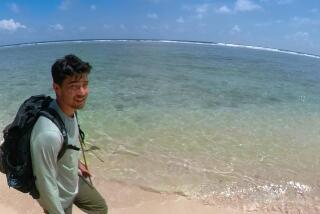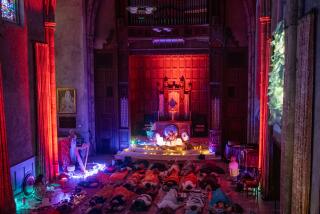Following the Spirit of the Bahamas Into Church : Religion and music drive everyday life in this subtropical Atlantic nation of 700 islands.
- Share via
NASSAU, Bahamas — I first heard about the young nun’s murder from the pulpit of Zion Baptist Church, just uphill from Nassau harbor on the island of New Providence. The pastor, in the ringing voice of an Old Testament prophet, decried the killing and proclaimed that hanging would be appropriate punishment for the church secretary who had been arrested for the crime.
“Amen, amen,” rose up in muffled chorus from around the Zion sanctuary. “Yes, yes,” said the doorkeeper behind my pew.
The pastor soared on with a compelling oration against drugs in the Bahamas (the murder was said to be linked to cocaine) and against the threat of communism, which he said had consumed other islands such as Cuba--just 60 miles from the southernmost of the Bahamas’ 700 islands.
Religion is a powerful force in Bahamian life; sermons cover topics of church and state and individual behavior. Music is another constant in the islands, and when the two forces meet--as they did in church that Sunday last fall--walls tremble and shoulders sway.
The roots of Bahamian music go back to driving African rhythms. The costumed carnival called Junkanoo--celebrated on Dec. 26 and Jan. 1--brings forth horns, whistles, cowbells, gourd rattles, goatskin drums and frenzied dancing in the streets.
Hotels stage mini-Junkanoo parades throughout the year for tourists to see the giant headdresses and hear the throbbing wail.
But old Nassau was quiet when I set out that Sunday morning; a steady breeze riffled through the palms of Rawson Square, where an indolent queue of horse-drawn surreys waited to carry tourists through the capital’s narrow lanes.
I walked the length of Bay Street, which parallels the waterfront, and dipped into the cavernous Straw Market, where traditional straw hats, satchels and dolls had been joined by that ubiquitous travel souvenir: T-shirts. Gospel music played on radios in many stalls, and women hummed along while weaving straw mats and flowers and boxes.
The end of Bay Street jogs around a pale pink wall with white pillars, one of the softly rouged faces of the Best Western British Colonial Hotel, which sprawls in yesteryear grandeur on eight lush acres. A group of Japanese girls hurried through the lobby, giggling at their new hairstyles--Bahamian cornrow braids, plaited for $1 a braid at the Straw Market.
Ceiling fans stirred the air in the hotel’s Palm Patio bar, site of some steamy scenes in the James Bond movie, “Never Say Never Again.” Two teen-agers in Chicago Bulls T-shirts were playing a video game beneath a corner TV on which a preacher was soliciting callers for the Prayer Line.
Outside the imposing Government House, a ragged line of cruise-ship passengers had formed to snap pictures of the statue of Christopher Columbus, who landed on the Bahamian island of San Salvador in 1492. A changing-of-the-guard ceremony with the Royal Bahamas Police Force Band occurs here every other Saturday--”most usually,” a native said.
I thought of the words of local archivist Gail Saunders: “We do not ‘celebrate’ Columbus and the destruction of our Lucayan Indians by the Spanish. But we do ‘commemorate’ his journey.”
I thought of the words of Nassau attorney Lynn Holowesko, a past president of the Bahamas National Trust: “Just naturally, we do things at a different pace here on the island.”
I thought of the words of Kayla Lockhart-Edwards, a classical singer, folklorist and composer: “To know our people you must really go to church. Bahamians express themselves openly there--the rich oratorios, the preaching. Kinship is strong; music is the bedrock.”
A blue-robed choir was marching out of St. Andrew Presbyterian Church on Princes Street. The minister, a Scot named Alastair McCormick, chatted with parishioners beneath the cool white arches of a broad veranda.
Then robust singing erupted a couple of blocks away and I traced the sound to a loudspeaker on the porch of Zion Baptist Church. A woman in a large blue hat opened the glass door and invited me into the air-conditioned sanctuary. There were no empty seats. She gestured to a youngster on the back row who moved closer to his family so that I could squeeze in.
It was 12:30. Half an hour remained in the two-hour service.
After four resonant verses of “Faith of Our Fathers” and a final “amen,” the throng moved out toward Bay Street.
As I paused in the shade of a banyan tree, a taxi approached.
The driver boomed: “Paradise?”
I thought I’d died and gone to heaven, until I realized that he was collecting passengers for the over-the-bridge ride to the bountiful resorts on Paradise Island.
More to Read
Sign up for Essential California
The most important California stories and recommendations in your inbox every morning.
You may occasionally receive promotional content from the Los Angeles Times.













